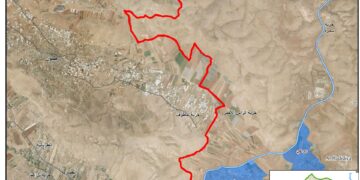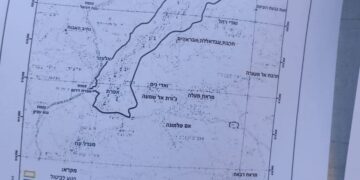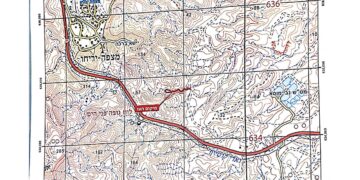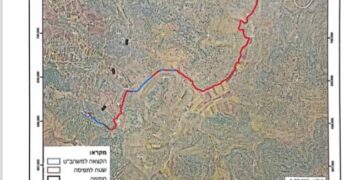- Violation: declaring 4500 dunums of Waqf properties as closed military zones.
- Location: Al-Auja / west Jericho city.
- Date: 13/01/2019.
- Perpetrator: The Israeli occupation army.
- Victims: Arab Al-Ka’abneh Bedouin communities in the area.
- Description:
The Israeli occupation forces raided Al-Auja in 13th January, and handed military orders to several herders south the village. The military orders declared 4500 dunums of natural block (44) a closed military zone.
The military orders prohibit herders’ access or any use of the lands that are originally owned by the Palestinian endowment.
About the Israeli arbitrary measures, General director of directorate of religious endowment and Islamic affairs Wael Natheef, in Jericho governorate told LRC reporter:
“We were shocked by the military orders that declared waqf lands closed military zones , we contacted the village council, the coordination office , colonization and wall resistance committee in order to stand against the occupations arbitrary measures , and lawyer Tawfiq Jabareen was assigned to prepare the legal file and follow up the case in the Israeli court”.
 |
 |
 |
 |
Photos 1-4: the targeted area
 |
 |
The attachment of the military order
It should be marked that 261,000 dunums of the Jordan Valley lands are categorized as endowment or “Waqf” , 222,000 dunums of them are now under Israel’s full control. Reportedly, the Ministry of religious endowment has control over only 37,018 dunums That were leased for farmers to invest and start up business on so that the revenue up scale the area’s economy and in order to protect the lands from colonial takeover plans. However, 29,343 are unused, the ministry looks for farmers to invest in them.
Al ‘Auja – an Overview:
It is located 12 km to the north east of Jericho city, adjacent to the Jordan River. It is edged by the eastern regional road that leads far north to Bisan. Its total area is 106900 dunums, inhabited by 4131 people.
The village’s boundaries reach up to Fasayel in the north and An Nuwei’ma (south), Jordan River (east) and Ramallah Mountains (west). Residents depend largely on agriculture in their living because of the availability of water. The Israeli Occupation captured huge areas of Al ‘Auja for colonial expansion purposes besides having several military bases there.
The Israelis, in addition, have isolated more than 20 dunums in an area known as As Sahel and was announced as a “military zone”. The Israelis have established several colonies around the village, Nitaf (1967), Niran (1977), Noomi (1979), Tomer, and Netiv Hagedud in addition to placing numerous watchtowers around the village.
Most importantly, the lack of water has been hindering any development efforts in the village. The Israelis had, first, dried out Al ‘Auja River which used to provide 1800 m3 / hour leaving the villagers dependant only on tiny springs with salty water. This had catastrophic effects on the residents and on the agricultural sector in the area.
Legal Feedback:
The constringing policy by the Israeli occupation authorities of confiscating Palestinian lands in order to build illegal random outposts and settlements can only be regarded as a violation of all international conventions and agreements like:
The International Covenant on Civil and Political Rights:
- All peoples may, for their own ends, freely dispose of their natural wealth and resources without prejudice to any obligations arising out of international economic co-operation, based upon the principle of mutual benefit, and international law. In no case may a people be deprived of its own means of subsistence.
The Universal Declaration of Human Rights:
Article 17: ” (1) Everyone has the right to own property alone as well as in association with others.
(2) No one shall be arbitrarily deprived of his property.”
The Land Research Center
LRC













